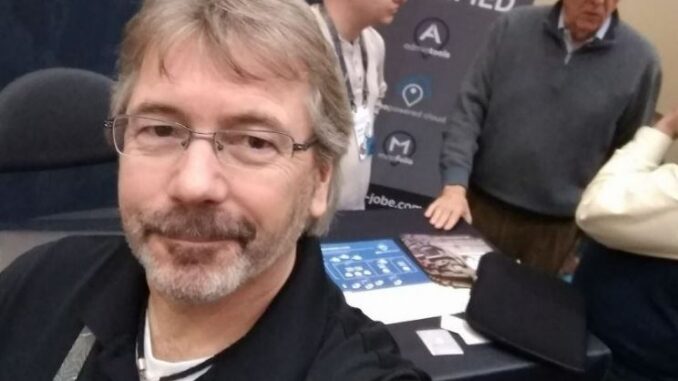
I don’t want to give the impression that all good things in geospatial originate at COGS in Nova Scotia. In my quest to get a better understanding of the great people and diversity of paths and pursuits in the geospatial community, I have encountered many institutions in all provinces that nurture excellent practitioners.
To encounter Glenn Letham is to be involved in the geospatial community communications loop. You may conclude that he is an American, but as your experience evolves, you realize that he is another home-grown Canadian geospatialist. How do the pieces of this puzzle fit together?
At first one is not sure of where he works because he mysteriously appears in a variety of locations: Seattle. Denver. Fort Collins. Palm Springs. Redlands (maybe he’s met Jack?). He attends a lot of conferences and is well-known in the industry. Sometimes he references beautiful Victoria, British Columbia.
Glenn Letham is evidently having fun as a geospatialist. He has his own YouTube Channel: There are videos of him driving in cars and talking shop with other brave geogeeks (including ESRI managers and GIS consultants) AKA “GeoGeeksInCars”. Here’s one from the 2018 ESRI Development Conference.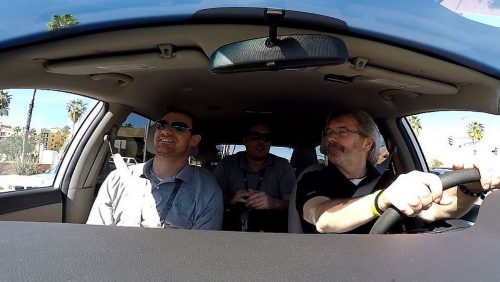
He has a coffee mug with “Map This” on it. Not too far-fetched a slogan because geospatialists will map anything! (You can get one for yourself at geo-jobe.com/shop)
He likes craft beer. What geospatialist doesn’t? One has to sample in different locations-water might make a difference…. Then again, one can always map them….
Glenn is Chief Marketing Officer at GEO Jobe, in Nashville, Tennssee. Chief Marketing Officer. That explains the extensive travel and “Map-This” swag. But in order to market a geospatial brand/service/company, you have to know something about geospatial. So it’s time to really find out about Glenn’s training, journeys and connections through GIS:
Peggy March: Where did you go to school for geography and geomatics?
Glenn Letham: I graduated from the University of Victoria with a B.Sc in Geography. I earned a degree with first class standing, having a focus on urban geography, GIS and quantitative methods. I also completed the Co-op program in the dept. of Geography – priceless!
Peggy March: Why are you so passionate about all things geospatial?
Glenn Letham: I’m not really sure where it comes from, although my Dad was in the navy for about 35 years so we moved around a lot and I would hear all about the cool places my Dad would travel to. I always enjoyed flipping through the atlas when I was very young and still do.
Peggy March: What is your specialty training?
Glenn Letham: In university I attempted to learn everything I could about GIS and computers which were relatively new at that time. A course in BASIC programming nudged me in the direction of GIS and eventually completing a B.Sc in Geography. Prior to that I had considered a business degree and also architecture.
Peggy March: What is the most interesting aspect of your job?
Glenn Letham: Definitely getting a chance to travel and meet industry visionaries, CEOs, and thought leaders. I enjoy attending trade shows and events. It’s much harder work than what many folks likely think and it can be pretty exhausting.
Peggy March: How did you move into the communications side of the geomatics business?
Glenn Letham: When I was a young GIS consultant I started a newsletter called SpatialNews. It grew and grew and grew and the rest is history! From there, I gained many years as a writer and editor and then wound up migrating into marketing.
Peggy March: Can you summarize what your job entails?
Glenn Letham: I’m the CMO so I’ve been charged with creating and implementing our marketing content strategy. Most of what people see is the social media component but there’s also much more. I write a lot (newsletters, marketing materials, technical articles), try to keep a handle on analytics, network and assist the community and most importantly I evangelize GIS and geo technology with a goal to help put the GEO Jobe name out there along with a good reputation. This small company gets a lot done and is loaded with talent so they really make it happen and make it fun as well.
Peggy March: What are the most exciting trends you see in location technology these days?
Glenn Letham: I’m an open data fan so that is exciting to follow and watch evolve. Additionally, more consumer and mainstream awareness about location technology (thanks to mobile) is quite awesome, although with that we are faced with new challenges, like usability, privacy and security. I’m excited also to see simple to use technology like ArcGIS Online, Story Maps, and Web AppBuilder. These innovations have made it very easy for anyone to build great maps and apps.
Peggy March: How many Redlands events have you attended over the years?
Glenn Letham: Honestly I don’t go to Redlands too often but I have been there several times for business. If you mean ESRI events I guess LOTS of them! This year will mark year #20 at ESRIUC in San Diego for me.
Peggy March: How have ESRI events changed/grown since you started attending? 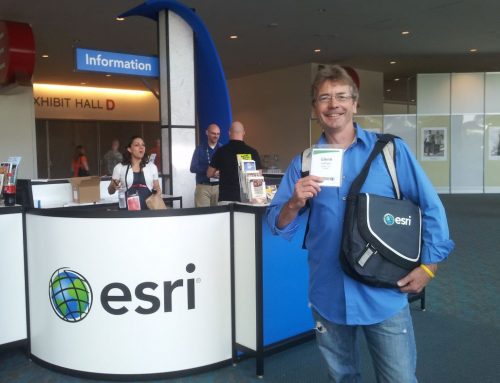
Glenn Letham: The ESRI conference just keeps on growing and growing. It’s almost overwhelming really. Beyond size, the focus has gotten much broader, the crowd is more international, but one thing remains: data is king! I really enjoy the small business and startup focus these days.
Peggy March: How different is the geospatial community in Canada compared to the USA?
Glenn Letham: All of my Canadian experience is in BC it seems, and here we have a pretty mature GeoGeek community. There’s a ton of smart people and I find the crowd here overall to be more geeky if that’s possible! We have loads of talent with 20-40 years of experience and thanks to our history in forestry and environmental resources, we have a very strong presence of pros from the remote sensing community. GIS pros here are very focused and very environmentally conscious.
Peggy March: Who or what motivates you?
Glenn Letham: I love technology, in particular new technology, mobile tech and gadgets. I love getting to try new stuff and getting my hands on things.
Peggy March: What advice would you give to geospatialists starting their careers?
Glenn Letham: If possible, I’d suggest going a co-op route in college or complete an internship before graduating. Be adventurous, travel, and go to local meets and tech events. Learn how to network and learn how to make a presentation. I think everyone should do an Ignite pitch or Lightning talk – it’s a great skill to learn. Also, students should investigate opportunities to attend local events and conferences for free or perhaps volunteering – ESRIUC offers this!
Peggy March: I have met Dr. Roger Tomlinson. Dave MacLean of COGS in Nova Scotia (subject of my second article for Go Geomatics) has met Cmdr. Chris Hadfield. Can you match that?
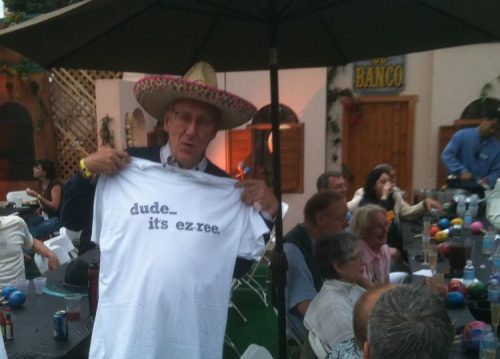
Glenn Letham: Hmm, that’s a pretty cool crowd. I guess my claims to fame would be many meets with Jack; I had a long meeting with Dr. Tomlinson in his hotel suite one year (Mrs. T served us tea and cookies, too), and I once received a call to my mobile from an astronaut friend of mine who was on the Space Station – sadly, I didn’t recognize the caller ID from Houston and let it go to voice mail – it was @astro_ron calling from the ISS!
Peggy March: Well, you got me there, Glenn! I could say I had technically had dinner with Roger Tomlinson (RCGS Fellows Dinner 2013 in Ottawa). But tea in his hotel suite tops that. However, Dave MacLean is still one up with the astronauts.
Not surprisingly, Glenn calls himself a “GEO evangelist”. He is passionate about geography and geospatial (it’s a requirement.) Maybe this says something about the quality of the Departments of Geography at Canadian universities in nurturing and inspiring the geospatial brain. Kudos to the University of Victoria!
Three key points:
1. Attend conferences
“Definitely getting a chance to travel and meeting industry visionaries, CEOs, and thought leaders… I enjoy attending trade shows and events. It’s much harder work than what many folks likely think and it can be pretty exhausting.”
2. Data
It is all about the data. Geospatial systems don’t work without the data/data sets.
3. Code…then code some more
We have moved a long way since programming in Basic. Learn HOW the system works, otherwise you’re just using software.
Geography degrees supplemented by computer/GIS training give you powerful analysis insights and capabilities for your geospatial career. There are many paths to success in the geospatial world. It can take you anywhere, like it has Glenn. And if his experience is any indication, you are going to have fun.
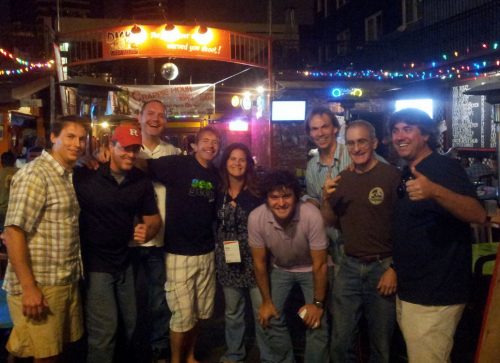


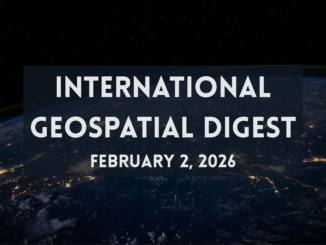


Be the first to comment